Israel education begins with passionate and knowledgeable educators who can tell their own stories about Israel and ends with learners whose stories live in dialogue with the story of the People, Land, and State of Israel.
To mark the occasion of The iCenter’s 10th anniversary, RMC Research was commissioned to conduct an impact study. It found that The iCenter has made a powerful and comprehensive impact on those who work directly with young people of all ages in all frameworks.
The report details The iCenter’s impact in shaping organizational cultures and supporting educators who directly reach learners.
Full Impact Report, October 2018
Abridged Impact Study, October 2018
The Greater Boston Jewish Teen Education and Engagement Initiative (the Initiative), launched in January of
2014 by Combined Jewish Philanthropies of Greater Boston (CJP) and the Jim Joseph Foundation, aims to enhance Jewish teen lives in the Greater Boston area. This report provides an overview of key evaluation findings and considerations from data collected in Phase III of the Initiative’s evaluation. The evaluation used a mixed methods approach, including surveys with two key informant groups and interviews with members of three additional groups.
CJP Boston Jewish Teen Education & Engagement Initiative Evaluation, Phase 3 Report: 2017-2018, October 2018
The Jewish Teen Education and Engagement Funder Collaborative is an unprecedented collaboration of national and local funders working together to develop, nurture, and scale new approaches to teen engagement. More than five years ago, the Foundation brought together ten communities to begin co-investing in new teen engagement efforts that would be informed by up-to-the-minute research and data. The participating communities today are united by six shared Measures of Success and are guided by Outcomes Which Positively Affect the Lives of Jewish Teens, a paradigm shift that demands that educators and the institutions in which they work deeply consider their core mission and now ask, “how can our work help this teen thrive as a human being in today’s complex and challenging world?”
Emerging Trends: Insights from the Jewish Teen Education and Engagement Funder Collaborative, Sara Allen, Director of the Collaborative, September 2018
Read the full Cross-Community Evaluation Findings for the Jewish Teen Education and Engagement Funder Collaborative, Rosov Consulting, September 2018
In this report, Rosov Consulting presents a set of 18 findings stemming from its analysis of quantitative and qualitative data gathered by evaluators working in eight of 10 communities constituting the Jewish Teen Education and Engagement Funder Collaborative during 2017. At the heart of the matter lie three central learning questions:
- How and to what extent are the community-based Jewish teen education and engagement initiatives collectively achieving the goals outlined in the Shared Measures of Success?
- What best practices and learnings emerging from the work of these initiatives (both anticipated and unanticipated) can be applied across the communities and to other Jewish education and engagement settings?
- How does variability across communities influence the design, implementation, and outcomes of the local community-based Jewish teen education and engagement initiatives?
Cross-Community Evaluation Findings for the Jewish Teen Education and Engagement Funder Collaborative, September 2018
Read a companion piece to the cross-community evaluation, Emerging Trends: Insights from the Jewish Teen Education and Engagement Funder Collaborative, Sara Allen, Director of the Collaborative, September 2018
Moishe House is the global leader in creating meaningful Jewish experiences for young adults in their 20s and early 30s, and now provides 10,000 programs annually, engaging more than 50,000 unique young adults (with more than 200,000 in total attendance each year). This evaluation is a follow-up to studies conducted in 2011 and 2015. It assesses the ongoing impact of the Moishe House model, with an emphasis on examining the newer Moishe House Without Walls (MHWOW) program. Evaluation findings presented in this executive summary are drawn from a survey conducted in late 2017 through early 2018, modified from the previous evaluation survey, as well as from program tracking data.
Key Findings:
- As Moishe House expands its reach and offerings (by 150% since 2011), it continues to yield a high impact, deepening participants’ connection to Judaism, Jewish community, and Jewish life. Moishe House helps young adults become stronger leaders in the Jewish community.
- As Moishe House continues to grow, it may be gradually attracting a growing proportion of participants with more nominal Jewish backgrounds.
- Beyond Moishe House’s house-based programs, MHWOW is a strategic way to engage young Jewish adults in Jewish experiences that are meaningful to them.Moishe House leaves a lasting impact on hosts, residents, and participants alike.
- Over time, people maintain their feelings of connection, continue their engagement in Jewish life, and retain knowledge and confidence in leading certain aspects of Jewish life.
Moishe House: 2018 Evaluation Findings, May 2018, Informing Change
Executive Summary
The four-year, nine-million-dollar New York Teen Initiative is a jointly funded investment of the UJA-Federation of New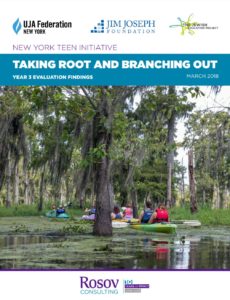 York and the Jim Joseph Foundation. With The Jewish Education Project serving as lead operator, the Initiative seeks to redesign and redefine the area’s Jewish teen engagement through the creation of compelling summer experiences. The Initiative builds on UJA Federation of New York’s historic and current efforts to support programs that attract teenagers to Jewish life and experiences. The Initiative is part of a national effort — spearheaded by the Jim Joseph Foundation — in which 14 foundations and federations are working together as a “Funder Collaborative” to expand and deepen Jewish teen education and engagement in 10 communities across the United States.
York and the Jim Joseph Foundation. With The Jewish Education Project serving as lead operator, the Initiative seeks to redesign and redefine the area’s Jewish teen engagement through the creation of compelling summer experiences. The Initiative builds on UJA Federation of New York’s historic and current efforts to support programs that attract teenagers to Jewish life and experiences. The Initiative is part of a national effort — spearheaded by the Jim Joseph Foundation — in which 14 foundations and federations are working together as a “Funder Collaborative” to expand and deepen Jewish teen education and engagement in 10 communities across the United States.
Conceived as an effort that would set in motion a long-term sea change in Jewish teen programming, the NYTI includes three main components:
1. Incubation of new programmatic models for Jewish teen summer experiences, including local New York area programs, domestic travel in the United States, and Israel travel.
2. Comprehensive marketing to increase awareness of new and existing summer opportunities.
3. Scholarship programs to help make new and existing summer experiences more affordable for teens’ families.
New York Teen Initiative: Taking Root and Branching Out, Year 3 Evaluation Findings, March 2018
The Denver Boulder Jewish Teen Education and Engagement Initiative (the Initiative) began in 2014 with a partnership between Rose 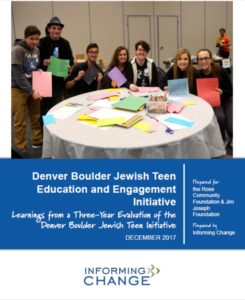 Community Foundation and Jim Joseph Foundation. The Initiative was conceived in response to research and a community engagement process done in 2010 by Rose Community Foundation’s Jewish Life Committee and the Allied Jewish Federation (now JEWISHcolorado) about engaging Jewish teens in greater Denver and Boulder.
Community Foundation and Jim Joseph Foundation. The Initiative was conceived in response to research and a community engagement process done in 2010 by Rose Community Foundation’s Jewish Life Committee and the Allied Jewish Federation (now JEWISHcolorado) about engaging Jewish teens in greater Denver and Boulder.
The desired ultimate impact from this Initiative is that throughout their lives, every teen in the Denver and Boulder Jewish communities can answer the question, “How can my Judaism inform, inspire, and advance the good I seek to do in the world?” To accomplish this, the four-year Initiative (2014–18) was created with three initial objectives in mind, and with an undercurrent of innovation running through its activities. The three objectives are:
1. Increase funding to existing innovators and new projects as a means to provide higher quality experiences and achieve incremental growth in teen participation.
2. Increase the number and quality of Jewish professionals and trained volunteers working with Jewish teens.
3. Promote youth-initiatives and youth-led ideas that engage teens and their peers in Jewish life.
The Initiative funders partnered with Informing Change to evaluate the Initiative over the first three years of its four-year lifespan.
Expanding Innovative Opportunities for Jewish Teens: Learnings from a Three-Year Evaluation of the Denver Boulder Jewish Teen Education and Engagement Initiative, March 2018, Executive Summary, Full Report
Preschool is an extraordinary time of connectedness and openness for children as well as parents. At no other time will parents be so 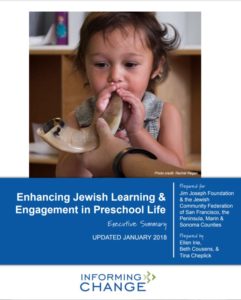 involved—so literally present—in their children’s schooling. During the early childhood years, parents reshape the way they spend their time, who they spend it with, and who they turn to as advisors. Children are also eager to learn and are developing socio-emotionally, cognitively, and spiritually.
involved—so literally present—in their children’s schooling. During the early childhood years, parents reshape the way they spend their time, who they spend it with, and who they turn to as advisors. Children are also eager to learn and are developing socio-emotionally, cognitively, and spiritually.
To take advantage of this time in families’ lives, in 2011 the Early Childhood Family Engagement Initiative (ECFEI) of the Jewish Community Federation and Endowment Fund of San Francisco, the Peninsula, Marin and Sonoma Counties, with significant support from the Jim Joseph Foundation, launched the Jewish Resource Specialist (JRS) Initiative. The JRS Initiative is intended to make the early childhood years a true gateway into Jewish life for children and their families. With ongoing coaching, mentoring, and supports from the JRS faculty at ECFEI, a teacher or other staff member is designated to spend 10 hours per week as a preschool’s JRS educator. In this role they are tasked with deepening Jewish learning at the preschool and increasing family engagement in Jewish life more generally. The JRS Initiative is designed to help Jewish early childhood education (ECE) programs realize their commitment to build a Jewish experience and environment for children and families.
The JRS Initiative also addresses the dearth of leaders working to build the field of Jewish ECE. Those who want to focus on Jewish ECE and build communities of engaged Jewish families with preschool-aged children are challenged to find the support, mentors, and professional development opportunities they need to craft a career path. The JRS Initiative seeks to meet these field-wide demands by developing the skills and Jewish knowledge of small cohorts of JRS educators who then bring ideas and guidance to their schools.
The JRS model has demonstrated, over two cohorts of ECE programs, that it can effectively address these needs during a three-year cycle of grant funding, educational curricula, and corollary supports. Evidence from an evaluation of the JRS pilot and subsequent data collected in 2017 provide evidence of lasting change.
Enhancing Jewish Learning & Engagement in Preschool Life (Executive Summary), January 2018
Enhancing Jewish Learning & Engagement in Preschool Life (Executive Summary and Full Report), January 2018
Onboarding new staff can set the tone for a professional relationship. Dive into some of the best practices from Leading Edge that enable employees to thrive from Day 1.
from Day 1.
Onboarding Best Practices: A Guide for Onboarding New Staff
The Jewish Outdoor, Food, Farming, and Environmental Education (JOFEE) Fellowship began in 2015 with the goal of placing three cohorts of Fellows at host institutions nationwide. To date, the Fellowship is halfway to this goal—the 17 Fellows of the first cohort have fully completed their Fellowship, and the 18 Fellows of the second cohort are well under way with theirs. Through the JOFEE Fellowship, Hazon, which designed and is implementing the Fellowship, and the Jim Joseph Foundation, which is funding the Fellowship, aim to:
1. Develop a training program that integrates Jewish and JOFEE learning and develops the Fellows as JOFEE educators;
2. Implement JOFEE programs across host institutions to help them sustain and invest in JOFEE programming; and
3. Create partnerships and resources for the JOFEE world.
The main focus of the Fellows’ work is to design and implement JOFEE programming at their placements. To support them, Fellows also receive training throughout the Fellowship, along with mentorship from a seasoned JOFEE professional.
JOFEE as a field is a relatively new concept for those involved in Jewish education. However, as revealed in research conducted in 2014 for the Seeds of Opportunity report—which evaluated the state of JOFEE overall—it is a powerful tool for targeting and engaging members of the Jewish community, particularly younger members. The Fellowship is a direct offshoot of the 2014 report, created with the primary goal to build the capacity of JOFEE educators, leading to a broader, more robust field.
The Jim Joseph Foundation and Hazon engaged Informing Change to conduct a four-year evaluation of the Fellowship. Rooted in the expected outcomes for the JOFEE Fellowship, this evaluation is designed to examine the components of the Fellowship within the framework of five evaluation questions.
Learnings from the JOFEE Fellowship, Year 2 Evaluation Report, September 2017
The Los Angeles Jewish Teen Initiative (LAJTI or the Initiative), through a funding partnership between the Jewish Federation of Greater 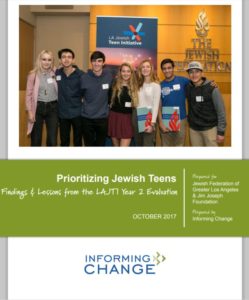 Los Angeles (the Federation) and the Jim Joseph Foundation (the funders), launched in 2015 and just completed its second year of implementation. To achieve the ultimate goal of engaging Jewish teens in Los Angeles in activities that promote a healthy, personally meaningful, and fulfilled Jewish life, LAJTI has three main strategies:
Los Angeles (the Federation) and the Jim Joseph Foundation (the funders), launched in 2015 and just completed its second year of implementation. To achieve the ultimate goal of engaging Jewish teens in Los Angeles in activities that promote a healthy, personally meaningful, and fulfilled Jewish life, LAJTI has three main strategies:
1. Expand and create teen engagement programs of excellence.
2. Nurture the teen ecosystem and build community commitment to teen engagement.
3. Support the professional development of educators of Jewish teens.
LAJTI seeks to create ripple effects throughout the community—including the teens who attend programs, their parents, program staff and leaders who design and deliver teen-focused programming, and community leaders and funders who champion and support the work.
The funders have partnered with Informing Change to evaluate LAJTI over its first three years. After completing the Year 1 evaluation report, which provided a baseline assessment of LAJTI, Informing Change collaborated with LAJTI staff and funders to develop seven evaluation questions to explore specifically in Year 2. LAJTI leaders wanted to understand certain phenomena in this second year of implementation that would inform the Initiative’s further development, while also retaining some of the original evaluation questions. This change also necessitated a shift in some of the data collection methods.
Prioritizing Jewish Teens: Findings & Lessons from the LAJTI Year 2 Evaluation, October 2017
Expanding the Circle of Teen Education & Engagement: Evaluation of Year 1 of the Los Angeles Jewish Teen Initiative, December 2016
Learn more: A Taste of the Real World: Lessons Learned from a Community Internship Program for Teens
With a $10.2 million combined investment from the AVI CHAI Foundation and the Jim Joseph Foundation (the funders), the Foundation for Jewish Camp (FJC) incubated four new Jewish specialty camps from October 2012 through November 2016, turning ideas into actual, functioning camps.
The fun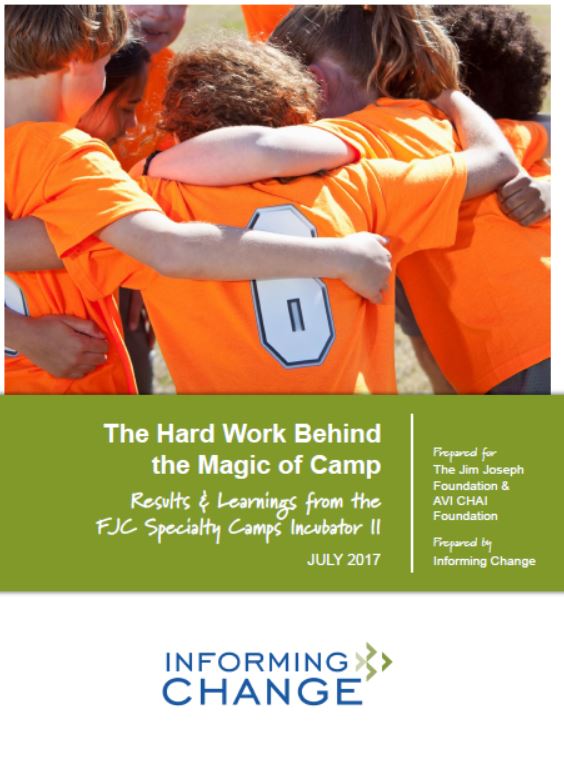 ders engaged Informing Change in October 2012 to design and implement a five-year evaluation of this second cohort of FJC’s Specialty Camps Incubator (the Incubator). Informing Change evaluated the extent to which the new camps developed the capacities needed to run strong summer programs, deliver intended camper outcomes, become sustainable nonprofit entities, and expand the number of Jewish youth attending camp. The evaluation findings are based on surveys from campers and parents, as well as interviews, site visits, observations, and materials reviews.
ders engaged Informing Change in October 2012 to design and implement a five-year evaluation of this second cohort of FJC’s Specialty Camps Incubator (the Incubator). Informing Change evaluated the extent to which the new camps developed the capacities needed to run strong summer programs, deliver intended camper outcomes, become sustainable nonprofit entities, and expand the number of Jewish youth attending camp. The evaluation findings are based on surveys from campers and parents, as well as interviews, site visits, observations, and materials reviews.
The Hard Work Behind the Magic of Camp: Results & Learnings from the FJC Specialty Camps Incubator II, Informing Change, August 2017
Executive Summary
Full Report
 York and the Jim Joseph Foundation. With The Jewish Education Project serving as lead operator, the Initiative seeks to redesign and redefine the area’s Jewish teen engagement through the creation of compelling summer experiences. The Initiative builds on UJA Federation of New York’s historic and current efforts to support programs that attract teenagers to Jewish life and experiences. The Initiative is part of a national effort — spearheaded by the Jim Joseph Foundation — in which 14 foundations and federations are working together as a “Funder Collaborative” to expand and deepen Jewish teen education and engagement in 10 communities across the United States.
York and the Jim Joseph Foundation. With The Jewish Education Project serving as lead operator, the Initiative seeks to redesign and redefine the area’s Jewish teen engagement through the creation of compelling summer experiences. The Initiative builds on UJA Federation of New York’s historic and current efforts to support programs that attract teenagers to Jewish life and experiences. The Initiative is part of a national effort — spearheaded by the Jim Joseph Foundation — in which 14 foundations and federations are working together as a “Funder Collaborative” to expand and deepen Jewish teen education and engagement in 10 communities across the United States. Community Foundation and Jim Joseph Foundation. The Initiative was conceived in response to research and a community engagement process done in 2010 by Rose Community Foundation’s Jewish Life Committee and the Allied Jewish Federation (now JEWISHcolorado) about engaging Jewish teens in greater Denver and Boulder.
Community Foundation and Jim Joseph Foundation. The Initiative was conceived in response to research and a community engagement process done in 2010 by Rose Community Foundation’s Jewish Life Committee and the Allied Jewish Federation (now JEWISHcolorado) about engaging Jewish teens in greater Denver and Boulder. involved—so literally present—in their children’s schooling. During the early childhood years, parents reshape the way they spend their time, who they spend it with, and who they turn to as advisors. Children are also eager to learn and are developing socio-emotionally, cognitively, and spiritually.
involved—so literally present—in their children’s schooling. During the early childhood years, parents reshape the way they spend their time, who they spend it with, and who they turn to as advisors. Children are also eager to learn and are developing socio-emotionally, cognitively, and spiritually.
 Los Angeles (the Federation) and the Jim Joseph Foundation (the funders), launched in 2015 and just completed its second year of implementation. To achieve the ultimate goal of engaging Jewish teens in Los Angeles in activities that promote a healthy, personally meaningful, and fulfilled Jewish life, LAJTI has three main strategies:
Los Angeles (the Federation) and the Jim Joseph Foundation (the funders), launched in 2015 and just completed its second year of implementation. To achieve the ultimate goal of engaging Jewish teens in Los Angeles in activities that promote a healthy, personally meaningful, and fulfilled Jewish life, LAJTI has three main strategies: ders engaged Informing Change in October 2012 to design and implement a five-year evaluation of this second cohort of FJC’s Specialty Camps Incubator (the Incubator). Informing Change evaluated the extent to which the new camps developed the capacities needed to run strong summer programs, deliver intended camper outcomes, become sustainable nonprofit entities, and expand the number of Jewish youth attending camp. The evaluation findings are based on surveys from campers and parents, as well as interviews, site visits, observations, and materials reviews.
ders engaged Informing Change in October 2012 to design and implement a five-year evaluation of this second cohort of FJC’s Specialty Camps Incubator (the Incubator). Informing Change evaluated the extent to which the new camps developed the capacities needed to run strong summer programs, deliver intended camper outcomes, become sustainable nonprofit entities, and expand the number of Jewish youth attending camp. The evaluation findings are based on surveys from campers and parents, as well as interviews, site visits, observations, and materials reviews.